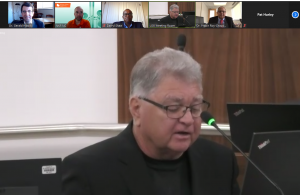
Gerald Hladik, MD, and Prabir Roy-Chaudhury, MD, joined Rob Hayden, executive director of the North Carolina National Kidney Foundation (NCNFD), on Thursday, November 19, to recognize the burden of kidney disease in North Carolina and express appreciation to policymakers for supporting the “Living Donor Protection Act.” They were joined by kidney donors and kidney transplant recipients who discussed the benefits of living donor transplantation and the need to support living kidney donors.
Representative Philip Shepard from Onslow County, who underwent a living kidney donor at UNC Medical Center, along with Darryl Shaw and his donor Jim Powell, explained the life transforming power of kidney transplantation to the General Assembly and public who attended the meeting. Living donor transplantation generally leads to improved long term kidney function and survival when compared to deceased donor transplants. In addition, living donor transplantation eliminates wait times, which can average seven years for deceased donor kidney transplant recipients.

The group also recognized how Americans living with kidney disease, especially transplant recipients and those on dialysis, face an increased risk of severe infection and mortality from COVID-19.
NC House Bill 1162: The Living Donor Protection Act, seeks to protect living donors from potential insurance discrimination, to provide an income tax credit for unreimbursed medical expenses resulting from certain organ and bone marrow donations, and to provide paid leave for state employees and other state-supported personnel who serve as living organ and bone marrow donors. The bill aligns with the national Advancing American Kidney Health Initiative (AAKHI) to reduce the risk of kidney failure by 25%; improve access to treatment so that 80% of new kidney failure patients can receive home dialysis, transplant or a new form of therapy; and double the number of available kidneys for transplant.
Hladik discussed the AAKHI in a recent New York Times article, with Abhi Kshirsagar, MD, deputy director of the UNC Kidney Center and chief medical director of UNC Dialysis Care.
Hladik is the Doc J Thurston Distinguished Professor of Medicine and chief of the division of nephrology. Kshirsagar is the Covington Distinguished Professor of Medicine in the division of nephrology. Roy-Chaudhury is co-director of the UNC Kidney Center and professor of medicine in the division of nephrology.
Learn more about kidney disease from the National Kidney Foundation.